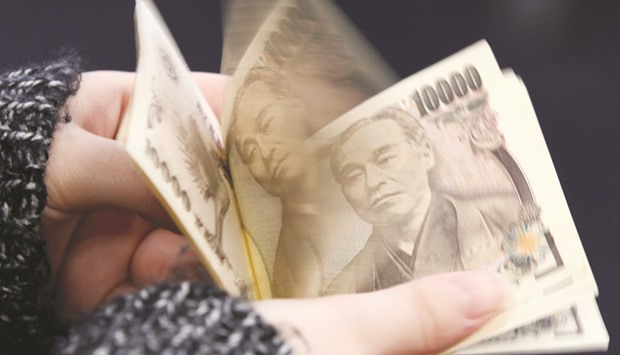The strengthening yen is encouraging investors to steer clear of a type of complex note that suffers when the Japanese currency gains.
Sales this year of so-called power reverse dual currency notes have dropped 41% to ¥24.2bn ($237.4mn) from the same period of 2015, according to information platform mtn-i.
The products pay coupons that fall when the yen gains. The currency has advanced about 18% against the dollar since December 31. Japanese investors are hunting returns after the central bank’s negative interest rate policy dragged yields on government bonds to record lows.
Prime Minister Shinzo Abe’s push to strengthen the export-driven economy by weakening the yen burnished the appeal of power reverse dual currency notes and pushed sales to 157bn yen in 2014, the most since the global financial crisis. But concerns about global growth have trumped the Bank of Japan’s easing to spark a rally this year in the yen, considered a haven currency.
“There has been less demand for PRDC bonds this year due to yen appreciation,” said Yugo Okumura, a financial engineer at Societe Generale SA in Tokyo. “Some products are losing value as they were taken out when the yen was weaker.”
The securities, which can usually be redeemed early by the issuer, pay a variable coupon that’s determined by the amount of yen that a given amount of the linked currency can buy. A strong appreciation in the yen beyond a certain level could mean the coupon would be reduced to 0.1% and put capital at risk, according to Okumura.
The Japanese currency was at about 101.95 per dollar yesterday in Tokyo, having strengthened from 120.22 at the end of last year. The forwards market is pricing in an appreciation to 99 per dollar by the end of 2017, although forecasters surveyed by Bloomberg are divided over the currency’s path and the median prediction is that it will weaken to 110 over the same horizon.
“Until last year, due to the impact of Abenomics, investor consensus was on yen depreciation and power reverse dual currency notes looked very attractive,” said Yuya Iida, head of fixed-income structuring for global markets at Deutsche Securities in Tokyo. “This year, many factors have made investors change their view on foreign exchange, including declines in the Nikkei, Brexit, global economic anxiety, and a change in market expectations for a US rate hike.”
Deutsche Bank, BNP Paribas SA and Societe Generale are the top three bank issuers of the notes this year, according to mtn-i. BNP Paribas declined to comment. The investments are typically 20- to 30-year products, according to Atsuko Fukuoka, who works in the structured products department at Daiwa Securities Co.
They’re usually linked to either the US dollar, the Australian dollar or selected emerging-market currencies and tend to be bought by corporate and institutional investors, she said.
One recent issue in the market came from Societe Generale, which sold 338mn yen of 10-year notes on July 26 that are linked to the Brazilian real.
Buyers of the securities will receive coupon payments of 7% for the first two years, with income after that linked to a multi-part formula tied to the yen-real exchange rate.
Arihiro Nagata, general manager at SMBC Nikko Securities, said holders of existing notes are concerned as they are receiving lower and lower coupons. “Yen appreciation will continue as the Bank of Japan’s power is shrinking,” he said.

A woman counts Japanese yen notes in Tokyo. The strengthening yen is encouraging investors to steer clear of a type of complex note that suffers when the Japanese currency gains.
